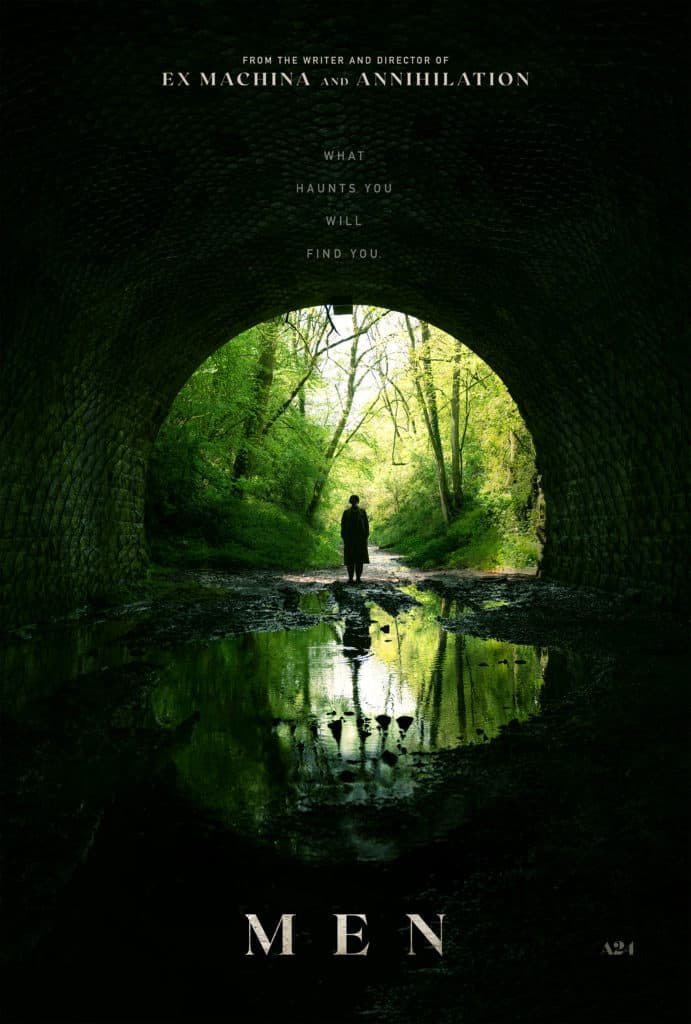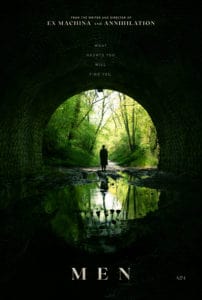
Men marks the third film collaboration between director Alex Garland and composing duo Geoff Barrow and Ben Salisbury. As with their prior projects, Ex Machina and Annihilation, it has a riveting, unorthodox score.
The film begins with Harper (played by Jessie Buckley), looking for solace after the death of her husband. She finds it (or at least hopes to) in a grand manor in the English country village of Cotson. And for a moment. She’s at peace, reveling in the quiet grandeur of the home and lush, rolling forests. Only the most sheltered, naïve viewer would expect this to last. Making this fleeting illusion more believable is Barrow and Salisbury’s score. They let the film begin with minimal score, and we associate Harper’s early trauma and loss, and her difficulty in facing it, with silence. After around twenty minutes, when she finds these weights seem to lift from her, their score seems to finally kick in. Mock organs fill the air, a religious welcome of atonement. It’s gentle, caressing, as if the earth is opening its arms to Harper and telling her everything will be okay. For a moment, we almost believe it too. But of course, this doesn’t last.
Harper finds a seemingly abandoned train tunnel into which she sings brief four-note melodies. They echo off the walls of the tunnel, eventually becoming surprisingly layered. Harper’s overjoyed experimentations abruptly end, and so too does any semblance of hope in the score.
Gone are the gentle organs, replaced by noise, discord, and piercing vocalizations. Most notably, though, are the somewhat haunted choruses. Male and female voices cry out from their graves in seemingly endless, enduring turmoil. It is as if the dead of a millennia have made Harper their target, these aimless spirits now finding a vessel for their pain. They become a relentless torment, pushing Harper and the viewer ever closer to the edge of madness.
Harper’s tunnel melodies find their way throughout the score. They become a sort of theme for the character, reminisces of a happier time (albeit brief). Fortunately, Barrow and Salisbury use them with restraint; it would have been very easy (and expected) to hear these constantly, numbing their effect. Instead, each iteration becomes a pleasant surprise.
I can’t stress enough (and regular readers/listeners may be tired of hearing) how much I love the use of voice in film music. It’s not surprise, then, that I ended up being partial to Barrow and Salisbury’s score. But not only does it sound good – perhaps uniquely unsettling is the better word – it also fits thematically within the film. The familiarity of the human voice frightens the listener, all while Harper too is stalked throughout the film by the familiar.
Unfortunately though, Men seems to be the least popular collaboration between the trio, both in terms of the film and the score. Perhaps the film’s music will eventually receive a revival, or perhaps everyone is just too scared of Men…
Editor’s Note: This score also featured in our column about the Best Film Scores of May 2022.




1 thought on “Men – Geoff Barrow and Ben Salisbury (2022)”
Comments are closed.